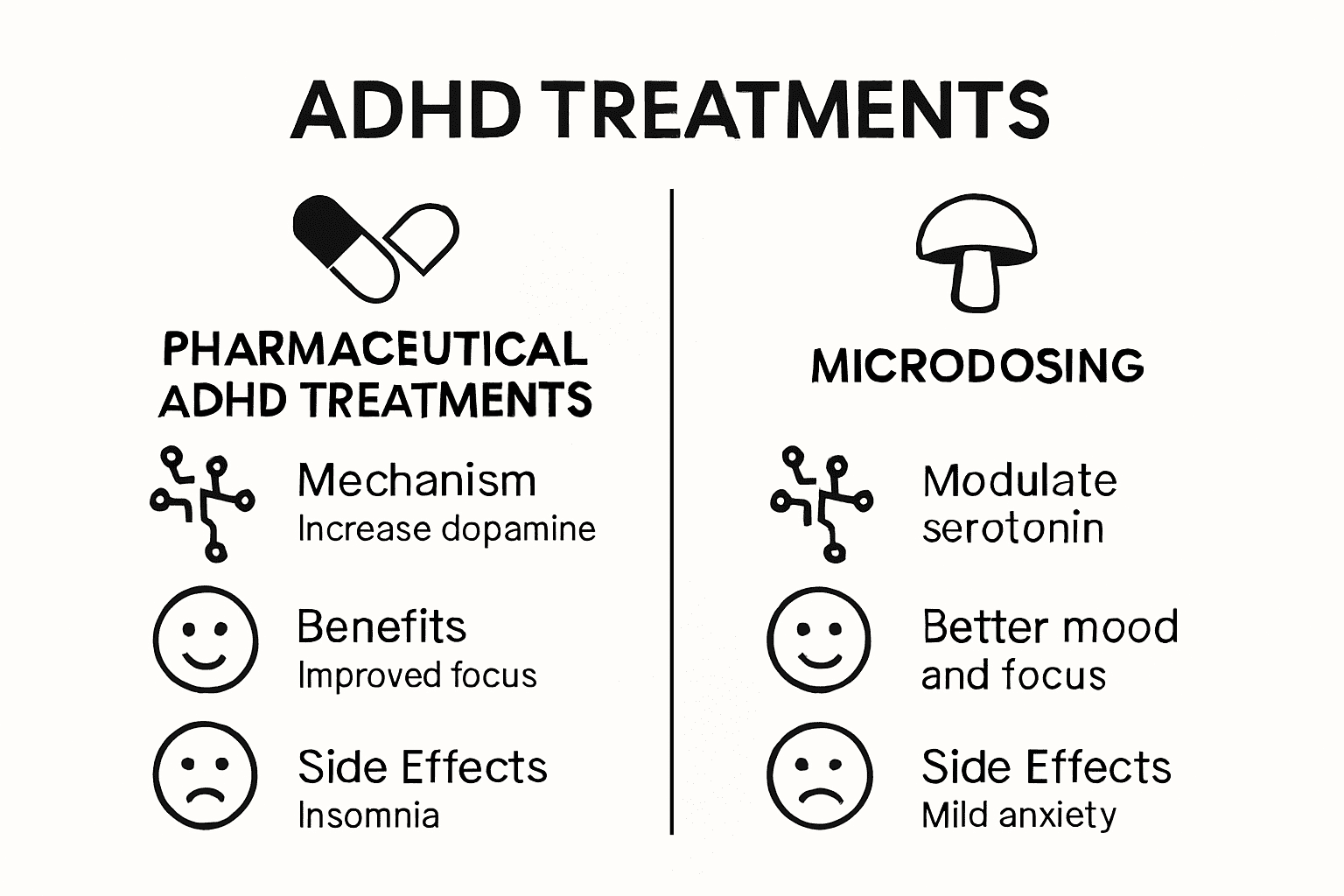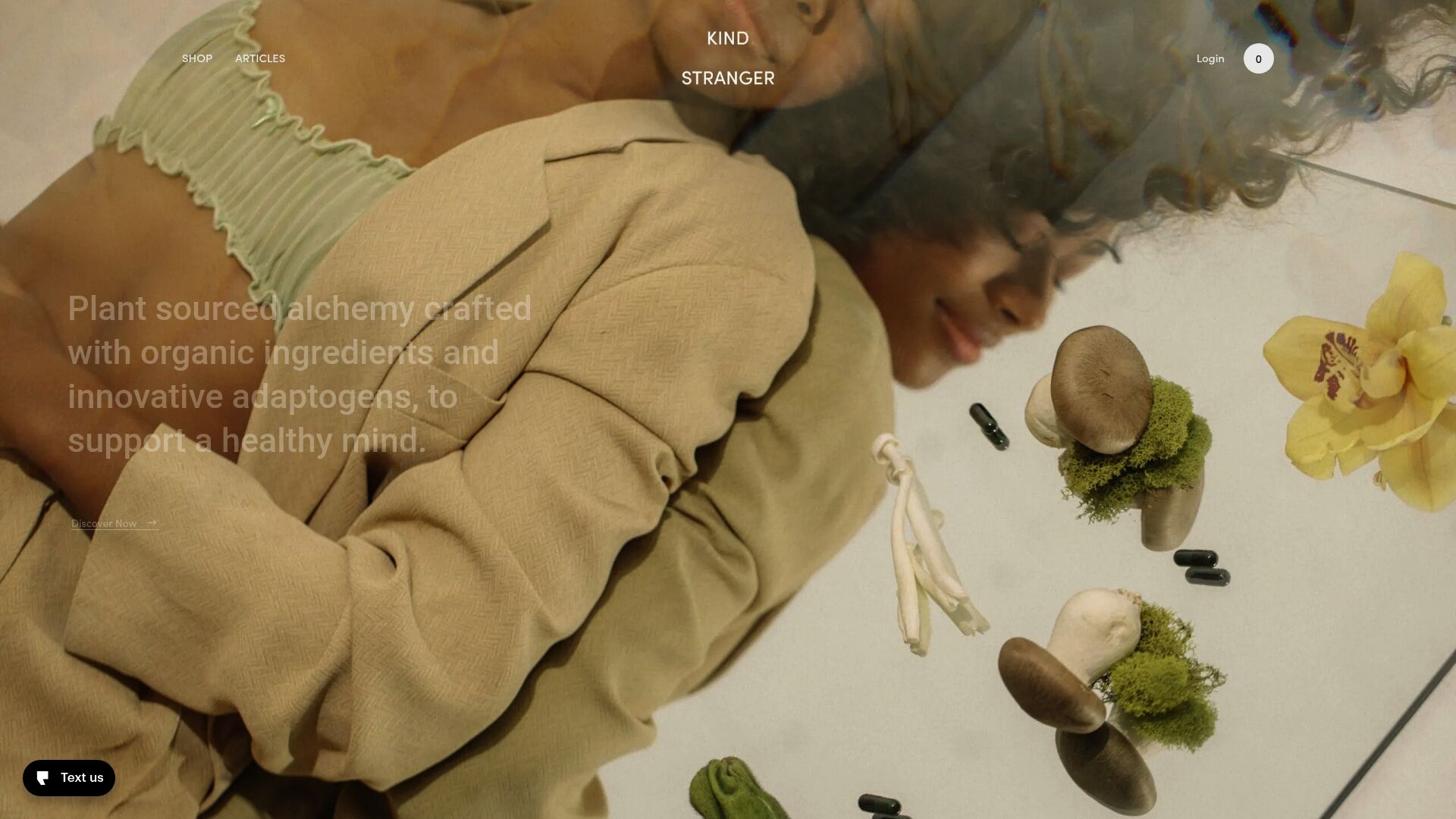Microdosing has become a buzzword for anyone curious about natural ways to sharpen focus or manage mental performance. People on Reddit are sharing stories of clearer thinking and calmer moods with tiny doses of psychedelics. Yet get this. One controlled study from the University of Basel found that microdosing LSD did not significantly improve ADHD symptoms compared to a placebo. So even with all the online hype, the scientific verdict is still wide open and leaves room for big questions that almost nobody’s asking.
Table of Contents
- What Is Microdosing And How Does It Work?
- Science Behind Microdosing For ADHD Symptoms
- Comparing Microdosing Vs. Traditional ADHD Treatments
- Legal Access And Buying Microdose Mushrooms Online In Canada
Quick Summary
| Takeaway | Explanation |
|---|---|
| Microdosing may enhance cognitive functions. | Small doses of psychedelics could improve mood, cognitive flexibility, and emotional stability without significant psychoactive effects. |
| Research on ADHD remains limited and cautious. | Current studies highlight potential benefits but emphasize the need for more rigorous trials to validate microdosing’s effectiveness in managing ADHD. |
| Microdosing is not a universal replacement for medications. | While promising, alternative treatments like microdosing should complement traditional ADHD therapies rather than fully replace them. |
| Seek professional guidance before microdosing. | Consulting healthcare professionals is essential for personalized assessments and to ensure safe practices when exploring microdosing. |
| Legal pathways exist for accessing microdose mushrooms in Canada. | Understanding regulations and sourcing from reputable providers is crucial for safe and legal microdosing practices. |
What Is Microdosing and How Does It Work?
Microdosing represents a precise and intentional approach to consuming small, sub-perceptible quantities of psychedelic substances to potentially enhance cognitive function and mental well-being. Unlike full doses that produce intense hallucinogenic experiences, microdosing involves consuming extremely small amounts that do not trigger dramatic sensory alterations or disruptive psychological states.
The Science Behind Microdosing Mechanisms
Researchers at UC Berkeley note that microdosing involves consuming approximately 1/10 to 1/20 of a standard psychedelic dose. These minute quantities interact subtly with neural receptors, potentially modulating brain chemistry without producing noticeable psychoactive effects. According to a comprehensive systematic review of 44 studies, microdosing can influence various neurological processes, including pain perception, time awareness, and potentially psychological functioning.
The neurological mechanisms involve complex interactions with serotonin receptors, particularly the 5-HT2A receptor, which plays a crucial role in cognitive processing, mood regulation, and neural plasticity. When microdosed substances engage these receptors, they may potentially enhance neural connectivity, improve cognitive flexibility, and support emotional balance.
Potential Neurological and Cognitive Impacts
Empirical evidence suggests microdosing might produce nuanced neurological changes. A detailed review of controlled studies examining low-dose psychedelics revealed potential alterations in multiple cognitive domains, including:
- Neural Connectivity: Possible improvements in brain network communication
- Social Cognition: Subtle enhancements in interpersonal perception and emotional processing
- Mood Regulation: Potential stabilization of emotional responses
These observations align with emerging research exploring microdosing’s potential as a natural cognitive support strategy. However, scientists emphasize the need for more comprehensive, long-term studies to definitively understand these intricate neurological interactions.
For individuals exploring natural approaches to cognitive enhancement, microdosing represents an intriguing frontier of neuroscientific research. While promising, it remains crucial to approach this practice with careful consideration, professional guidance, and a commitment to understanding individual neurological responses.
Science Behind Microdosing for ADHD Symptoms
Understanding the scientific mechanisms of microdosing for ADHD symptoms requires a nuanced exploration of neurochemical interactions and potential cognitive modulation. Research in this emerging field presents a complex picture of how sub-perceptible psychedelic doses might interact with neurological processes associated with attention, focus, and emotional regulation.
Neurochemical Interactions and Cognitive Processing
A naturalistic prospective study examining individuals with severe ADHD symptoms revealed intriguing insights into potential neurochemical interactions. Researchers observed subtle improvements in emotion regulation and empathy among participants engaging in psychedelic microdosing. However, the study strongly emphasized the critical need for more rigorous controlled trials to validate these preliminary findings.
The neurological mechanisms potentially involve complex interactions with serotonin receptors, particularly the 5-HT2A receptor system. These receptors play a crucial role in modulating neural plasticity, potentially influencing cognitive flexibility and attention processes characteristic of ADHD. By subtly engaging these neural pathways, microdosing might offer a nuanced approach to supporting cognitive function.
Current Research Limitations and Challenges
Contrary to anecdotal claims, scientific evidence remains cautiously skeptical. A randomized, double-blind, placebo-controlled trial conducted by the University of Basel investigated LSD microdosing’s effects on adults with ADHD. The study concluded that microdosing did not significantly improve ADHD symptoms compared to a placebo, highlighting the complexity of neurological interventions.
A comprehensive review of controlled studies further underscored the scientific uncertainty. While low doses of psychedelics appeared generally safe and produced acute behavioral effects, repeated doses did not consistently alter mood or cognition. This suggests that the potential benefits of microdosing for ADHD remain speculative and require extensive further research.
Individuals interested in exploring alternative cognitive support strategies should approach microdosing with careful consideration. The current scientific landscape emphasizes the importance of professional medical guidance, comprehensive understanding of individual neurological responses, and a commitment to evidence-based approaches in managing ADHD symptoms.
While promising preliminary research exists, the scientific community unanimously agrees that more rigorous, long-term studies are essential to definitively understand microdosing’s potential role in ADHD symptom management. Patients and researchers alike must maintain a balanced perspective, valuing both scientific skepticism and the potential for innovative neurological interventions.
Comparing Microdosing vs. Traditional ADHD Treatments
Navigating ADHD treatment options requires a comprehensive understanding of both traditional pharmaceuticals and emerging alternative approaches like microdosing. Each treatment strategy presents unique benefits, challenges, and potential therapeutic mechanisms for managing attention deficit and cognitive function.

Pharmaceutical Treatments vs. Microdosing Approaches
Traditional ADHD treatments typically involve stimulant medications like methylphenidate and amphetamine-based drugs, which directly target neurotransmitter regulation. In contrast, microdosing represents a nuanced approach that subtly modulates neural pathways without producing intense psychoactive effects.
A naturalistic prospective study comparing psychedelic microdosing with conventional ADHD medications revealed intriguing findings. Over a four-week period, participants using microdosing reported significant reductions in inattention and hyperactivity/impulsivity symptoms. Notably, the microdosing group demonstrated improved emotion regulation, particularly in expressive suppression, suggesting potential alternative therapeutic mechanisms.
Efficacy and Symptom Management
Research indicates varied responses to different treatment modalities. Clinical investigations exploring psychedelic microdosing observed promising outcomes, including increased trait mindfulness and decreased neuroticism among participants. A randomized clinical trial further substantiated these findings, demonstrating that low-dose psychedelics were well-tolerated and potentially effective in managing ADHD symptoms.
Traditional pharmaceutical treatments typically offer more immediate and predictable symptom management. Stimulant medications work rapidly to enhance dopamine and norepinephrine levels, directly improving focus and reducing impulsivity. Microdosing, by comparison, appears to operate through more subtle neurological pathways, potentially offering a gentler approach to cognitive support.
Considerations and Future Research
While emerging research shows promise, the scientific community emphasizes the need for comprehensive, long-term studies. Ongoing clinical trials continue investigating the safety and efficacy of alternative treatments like microdosing. Individuals interested in exploring innovative cognitive support strategies should consult healthcare professionals to develop personalized treatment plans.
Key differences between traditional and microdosing approaches include:
- Mechanism of Action: Pharmaceutical treatments directly manipulate neurotransmitter levels, while microdosing appears to modulate neural connectivity more subtly
- Side Effect Profile: Traditional medications often have more pronounced side effects compared to microdosing
- Individual Variability: Response to treatment varies significantly between individuals
Here’s a side-by-side comparison of key differences between traditional pharmaceutical ADHD treatments and psychedelic microdosing approaches discussed in the article:
| Feature | Traditional ADHD Medications | Microdosing Approaches |
|---|---|---|
| Mechanism of Action | Directly increase neurotransmitters (dopamine, norepinephrine) | Subtly modulate neural pathways, mainly serotonin (5-HT2A receptor) |
| Symptom Relief Speed | Rapid, immediate effects | More subtle, gradual (if any) effects |
| Side Effect Profile | Often more pronounced | Typically milder, less disruptive |
| Research Evidence | Well-established and rigorous | Emerging, limited, needs further study |
| Emotional/Mood Impact | May stabilize mood | Potentially improves emotion regulation |
| Individual Variability | Variable, but more predictable | Highly individualized and variable response |
| Use Recommendation | First-line, standard treatment | Experimental/Complementary, not replacement |
The evolving landscape of ADHD treatment highlights the importance of personalized, holistic approaches. While microdosing shows potential, it should not be considered a universal replacement for established medical interventions. Continued research, professional guidance, and individual assessment remain crucial in developing effective ADHD management strategies.
Legal Access and Buying Microdose Mushrooms Online in Canada
Navigating the legal landscape of microdose mushrooms in Canada requires a comprehensive understanding of current regulations, medical research initiatives, and responsible consumption practices. The evolving legal framework surrounding psilocybin reflects a growing recognition of its potential therapeutic applications and the need for nuanced, evidence-based approaches to mental health treatment.
Regulatory Landscape and Medical Research
Canada has been at the forefront of progressive psychedelic research, with significant government investment in understanding psilocybin’s therapeutic potential. In June 2023, the Canadian government committed nearly $3 million through the Canadian Institutes of Health Research to support clinical trials examining psilocybin-assisted psychotherapy. These trials aim to assess the safety and effectiveness of psilocybin in treating various mental health conditions, including alcohol use disorder, treatment-resistant depression, and end-of-life psychological distress.
While psilocybin remains a controlled substance, there are specific legal pathways for accessing microdose mushrooms. Health Canada has implemented special access programs and compassionate use regulations that allow individuals with specific medical conditions to obtain psilocybin under carefully controlled circumstances. Individuals interested in exploring legal microdosing options can review current regulations to understand the nuanced legal framework.
Online Purchasing and Safety Considerations
Buying microdose mushrooms online in Canada requires careful navigation of legal and safety considerations. Reputable online providers must adhere to strict quality control standards, provide transparent sourcing information, and ensure products are intended for research or therapeutic purposes under appropriate medical guidance.
A naturalistic prospective study investigating psychedelic microdosing highlighted the importance of responsible consumption. The research emphasized that while microdosing shows promise for conditions like ADHD, individuals must approach this option with careful medical supervision and a comprehensive understanding of potential interactions and individual neurological responses.
Key considerations for safe and legal microdosing include:
- Medical Consultation: Always consult healthcare professionals before beginning any microdosing regimen
- Legal Compliance: Understand current regulations and approved access pathways
- Product Quality: Source from reputable providers with transparent testing and sourcing practices
- Individual Assessment: Recognize that microdosing effects vary significantly between individuals
The following table summarizes important safety and legal considerations for buying and using microdose mushrooms in Canada based on the article:
| Consideration | Key Point |
|---|---|
| Medical Consultation | Always consult healthcare professionals before starting microdosing |
| Legal Compliance | Ensure understanding of current Canadian regulations and approved medical access pathways |
| Product Quality | Purchase only from reputable sources with transparent testing and sourcing practices |
| Individual Assessment | Effects vary greatly by person; monitor your own response |
| Research Progress | Ongoing research; safety and long-term efficacy still unproven |
The emerging research landscape suggests a promising future for microdosing as a potential therapeutic approach. However, individuals must prioritize legal compliance, medical guidance, and a responsible approach to exploring alternative mental health support strategies. As research continues to evolve, the legal and medical understanding of microdosing will likely become more nuanced and comprehensive.
For those considering microdosing as a potential support method for ADHD or other mental health challenges, ongoing education, professional medical consultation, and a commitment to understanding individual neurological responses remain paramount.

Frequently Asked Questions
What is microdosing and how does it work?
Microdosing involves taking small, sub-perceptual amounts of psychedelic substances to potentially enhance cognitive function and mental well-being without experiencing significant psychoactive effects. It engages neural receptors, particularly serotonin, which may modulate brain chemistry subtly.
Can microdosing help with ADHD symptoms?
Current research is limited and cautious. Some studies suggest potential improvements in emotional regulation and cognitive flexibility, yet a controlled study from the University of Basel found no significant improvement in ADHD symptoms compared to a placebo.
How does microdosing compare to traditional ADHD treatments?
Traditional ADHD medications, like stimulants, typically provide rapid and predictable symptom relief by directly targeting neurotransmitter levels. In contrast, microdosing may offer a more subtle modulation of cognitive functions but requires more research to establish its efficacy for ADHD.
What should I consider before trying microdosing for ADHD?
Consulting with a healthcare professional is essential before starting microdosing. It’s important to understand the legal landscape, potential effects, and individual differences in response, as well as ensuring a safe and informed approach to this practice.
Explore Safer Microdosing Paths for ADHD Support
If you are searching for natural ways to boost focus or emotional balance because traditional ADHD treatments do not always fit your needs, you are not alone. The article highlighted how the benefits of microdosing, such as mental clarity and cognitive flexibility, are still being studied and can be hard to access safely. You care about finding real answers that match your individual journey, including learning about legal access, dosing, and quality products.

Ready to discover trusted microdosable psilocybin options for wellness and focus? Visit Kind Stranger for expert guidance, detailed FAQs on Canadian psilocybin legality, and carefully crafted microdose products formulated for those interested in mindful brain support. Take your next step toward clarity and emotional stability today—explore product details and informed microdosing tips at Kind Stranger’s main page and empower your ADHD support plan with confidence.
Recommended
- Microdosing for Creativity: Boost Ideas and Focus in 2025 • KIND STRANGER
- Microdosing and Meditation: Enhance Focus and Wellbeing in 2025 • KIND STRANGER
- Microdosing and Exercise: Unlocking Natural Wellness Benefits 2025 • KIND STRANGER
- Psilocybin for Social Anxiety: Natural Relief in 2025 • KIND STRANGER


Comments
There are no comments yet.